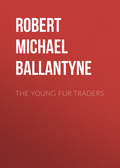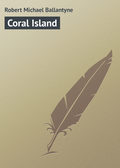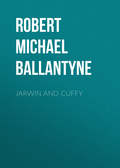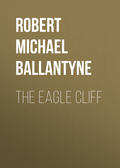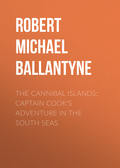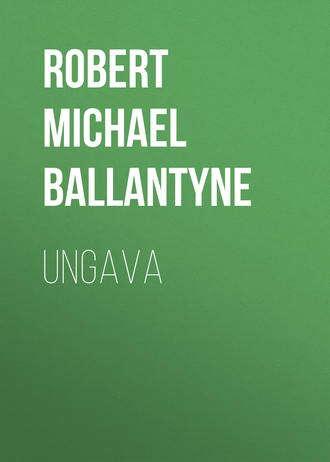
Robert Michael Ballantyne
Ungava
Chapter Twenty.
Winter approaches—Esquimaux arrive—Effect of a word—A sucking baby—Prospects of trade
For many days after the ship’s departure the work of completing the fort went forward with the utmost rapidity, and not until the houses and stores were rendered weather-tight and warm did Stanley consider it advisable to send out hunting and fishing parties into the mountains. Now, however, the frosts continued a great part of the day as well as during the night, so it was high time to kill deer and fish, in order to freeze, and so preserve them for winter’s consumption.
Up to this time no further traces of Esquimaux had been discovered, and Stanley began to express his fears to Frank that they had left the neighbourhood altogether, in consequence of the repeated attacks made upon them by Indians. Soon after this, however, the fur-traders were surprised by a sudden visit from a party of these denizens of the north.
It happened on the afternoon of a beautiful day towards the close of autumn, that charming but brief season which, in consequence of its unbroken serenity, has been styled the Indian summer. The men had all been dispatched into the mountains in various directions, some to fish, others to shoot; and none were left at the fort except its commandant with his wife and child, and Oolibuck the Esquimau. Stanley was seated on a stone at the margin of the bay, admiring the vivid alterations of light and shade, as the sun dipped behind the mountains of the opposite shore, when his eye was attracted towards one or two objects on the water near the narrows. Presently they advanced, and were followed by several others. In a few minutes he perceived that they were Esquimau canoes.
Jumping hastily up, Stanley ran to the fort, and bidding his wife and child keep out of sight, put two pair of pistols in his pockets and returned to the beach, where he found Oolibuck gazing at the approaching flotilla with intense eagerness.
“Well, Oolibuck, here come your countrymen at last,” said Stanley. “Do they look friendly, think you?”
“Me no can tell; they most too quiet,” replied the interpreter.
Esquimaux in general are extremely noisy and full of animated gesticulation on meeting with strangers, especially when they meet on decidedly friendly terms. The silence, therefore, maintained by the natives as they advanced was looked upon as a bad sign. The fleet consisted of nine kayaks, and three large oomiaks full of women and children; and a curious appearance they presented at a distance, for the low kayaks of the men being almost invisible, it seemed as if their occupants were actually seated on the water. The oomiaks being much higher, were clearly visible. On coming to within a quarter of a mile of the fort, the men halted to allow the women to come up; then forming in a crescent in front of the oomiaks, the whole flotilla advanced slowly towards the beach. When within a hundred yards or so, Stanley said, “Now, Oolibuck, give them a hail.”
“Chimo! Chimo! Chimo-o-o!” shouted the interpreter.
The word acted like a talisman.
“Chimo!” yelled the Esquimaux in reply, and the kayaks shot like arrows upon the sand, while the women followed as fast as they could. In another minute a loud chattering and a brisk shaking of hands was taking place on shore.
The natives were dressed in the sealskin garments with which arctic travellers have made us all more or less acquainted. They were stout burly fellows, with fat, oily, and bearded faces.
“Now tell them, Oolibuck, the reason of our coming here,” said Stanley.
Oolibuck instantly began, by explaining to them that they had come for the purpose of bringing about peace and friendship between them and the Indians; on hearing which the Esquimaux danced and shouted for nearly a minute with joy. But when the interpreter went on to say that they intended to remain altogether among them, for the purpose of trading, their delight knew no bounds; they danced and jumped, and whooped and yelled, tossed up their arms and legs, and lay down on the sand and rolled in ecstasy. In the midst of all this, Mrs Stanley rushed out of the house, followed by Edith, in great terror at the unearthly sounds that had reached her ears; but on seeing her husband and Oolibuck laughing in the midst of the grotesque group, her fears vanished, and she stood an amused spectator of the scene.
Meanwhile, Stanley went down and stepped into the midst of one of the oomiaks, with a few beads and trinkets in his hands; and while Oolibuck entertained the men on shore, he presented gifts to the women, who received them with the most childish demonstrations of joy. There was something irresistibly comic in the childlike simplicity of these poor natives. Instead of the stiff reserve and haughty demeanour of their Indian neighbours, they danced and sang, and leaped and roared, embraced each other and wept, with the most reckless indifference to appearances, and seemed upon all occasions to give instant vent to the feelings that happened to be uppermost in their minds. As Stanley continued to distribute his gifts, the women crowded out of the other oomiaks into the one in which he stood, until they nearly sank it; some of them extending their arms for beads, others giving a jolt to the hoods on their backs, which had the effect of bringing to light fat, greasy-faced little babies, who were pointed to as being peculiarly worthy of attention.
At length Stanley broke from them and leaped ashore, where he was soon followed by the entire band. But here new objects—namely, Mrs Stanley and Edith—attracted their wondering attention. Approaching towards the former, they began timidly to examine her dress, which was indeed very different from theirs, and calculated to awaken curiosity and surprise. The Esquimau women were dressed very much like the men—namely, in long shirts of sealskin or deerskin with the hair on, short breeches of the same material, and long sealskin boots. The hoods of the women were larger than those of the men, and their boots much more capacious; and while the latter had a short stump of a tail or peak hanging from the hinder part of their shirts, the women wore their tails so long that they trailed along the ground as they walked. In some cases these tails were four and six inches broad, with a round flap at the end, and fringed with ermine. It was, therefore, with no little surprise that they found Mrs Stanley entirely destitute of a tail, and observed that she wore her upper garment so long that it reached the ground. Becoming gradually more familiar, on seeing that the strange woman permitted them to handle her pretty freely, one of them gently lifted up her gown to see whether or not she wore boots; but receiving a somewhat prompt repulse, she began to caress her, and assured her that she did not mean to give offence.
By this time Frank and some of the men had joined the group on the shore, and as it was getting late Stanley commanded silence.
“Tell them I have somewhat to say to them, Oolibuck.”
The interpreter’s remark instantly produced a dead silence.
“Now ask them if they are glad to hear that we are going to stay to trade with them.”
A vociferous jabbering followed the question, which, by Oolibuck’s interpretation, meant that their joy was utterly inexpressible.
“Have they been long on the coast?”
“No; they had just arrived, and were on their way up the river to obtain wood for building their kayaks.”
“Did they see the bundle of presents we left for them at the coast?”
“Yes, they had seen it; but not knowing whom it was intended for, they had not touched it.”
On being told that the presents were intended for them, the poor creatures put on a look of intense chagrin, which, however, passed away when it was suggested to them that they might take the gifts on their return to the coast.
“And now,” said Stanley, in conclusion, “’tis getting late. Go down to the point below the fort and encamp there for the night. We thank you for your visit, and will return it in the morning. Good-night.”
On this being translated, the Esquimaux gave a general yell of assent and immediately retired, bounding and shouting and leaping as they went, looking, in their gleesome rotundity, like the infant progeny of a race of giants.
“I like the look of these men very much,” said Stanley, as he walked up to the house with Frank. “Their genuine trustfulness is a fine trait in their character.”
“No doubt of it,” replied Frank. “There is much truth in the proverb, ‘Evil dreaders are evil doers.’ Those who fear no evil intend none. Had they been Indians, now, we should have had more trouble with them.”
“I doubt it not, Frank. You would have been pleased to witness the prompt alacrity with which the poor creatures answered to our cry of Chimo, and ran their kayaks fearlessly ashore, although, for all they knew to the contrary, the rocks might have concealed a hundred enemies.”
“And yet,” said Frank, with an air of perplexity, “the Esquimau character seems to me a difficult problem to solve. When we read the works of arctic voyagers, we find that one man’s experience of the Esquimaux proves them to be inveterate thieves and liars, while another speaks of them as an honest, truthful people—and that, too, being said of the same tribe. Nay, further, I have read of a tribe being all that is good and amiable at one time, and all that is bad and vile at another. Now the conduct of these good-natured fellows, in reference to the bundle of trinkets we left at the mouth of the river, indicates a degree of honesty that is almost too sensitive; for the merest exertion of common-sense would show that a bundle hung up in an exposed place to public view must be for the public good.”
“Nevertheless they seem both honest and friendly,” returned Stanley, “and I trust that our experience of them may never change. To-morrow I shall give them some good advice in regard to procuring furs, and show them the wealth of our trading store.”
When the morrow came the visit of the Esquimaux was returned by the entire force of Fort Chimo, and the childish delight with which they were received was most amusing. The childishness, however, was only applicable to these natives when expressing their strong feelings. In other respects, particularly in their physical actions, they were most manly; and the thick black beards and moustaches that clothed the chins of most of the men seemed very much the reverse of infantine. The children were so exactly like to their parents in costume that they seemed miniature representations of them. In fact, were a child viewed through a magnifying glass it would become a man, and were a man viewed through a diminishing glass he would become a child—always, of course, excepting the beard.
Bryan became a special favourite with the natives when it was discovered that he was a worker in iron, and the presents with which he was overwhelmed were of a most extraordinary, and, in some cases, perplexing nature. One man, who seemed determined to get into his good graces, offered him a choice morsel of broiled seal. “No, thankee, lad,” said Bryan; “I’ve had my brickfust.”
Supposing that the broiling had something to do with the blacksmith’s objection, the Esquimau hastily cut off a slice of the raw blubber and tendered it to him.
“D’ye think I’m a haythen?” said Bryan, turning away in disgust.
“Ah, try it, Bryan,” cried La Roche, turning from an Esquimau baby, in the contemplation of which he had been absorbed—“try it; ’tis ver’ goot, I ’sure you. Ver’ goot for your complaint, Bryan. But come, here, vitement.—Just regardez dat hinfant. Come here, queek!”
Thus urged, Bryan broke away from his host (who had just split open the shinbone of a deer, and offered him the raw marrow, but without success), and, going towards La Roche, regarded the baby in question. It was a remarkably fine child, seemingly about ten months old, with a round, rosy, oily face, coal-black hair, and large, round, coal-black eyes, with which it returned the stare of the two men with interest. But that which amused the visitors most was a lump of fat or blubber, with a skewer thrust through it, which its mother had given to the child to suck, and which it was endeavouring to thrust down its throat with both hands.
“Come here, Oolibuck; pourquoi is de stick?”
“Ho, ho, ho!” laughed Oolibuck. “Dat is for keep de chile quiet; and de stick is for no let him choke; him no can swallow de stick.”
“Musha! but it would stick av he did swallow it,” said Bryan, turning away with a laugh.
In the course of the day Stanley and Frank conducted the natives to the fort, and having given them all an excellent dinner and a few gifts of needles, scissors, and knives, led them to the store, where the goods for trade were ranged temptingly on shelves round the walls. A counter encompassed a space around the entrance-door, within which the natives stood and gazed on wealth which, to their unsophisticated minds, seemed a dream of enchantment.
Having given them time to imbibe a conception of the room and its treasures, Stanley addressed them through the interpreter; but as reference to this worthy individual is somewhat hampering, we will discard him forthwith—retaining his style and language, however, for the benefit of his fellow-countrymen.
“Now, you see what useful things I have got here for you; but I cannot give them to you for nothing. They cost us much, and give us much trouble to bring them here. But I will give them for skins and furs and oil, and the tusks of the walrus; and when you go to your friends on the sea-coast, you can tell them to bring skins with them when they come.”
“Ye vill do vat you vish. Ye most happy you come. Ye vill hunt very mush, and make your house empty of all dese t’ings if ye can.”
“That’s well. And now I am in need of boots for my men, and you have a good many, I see; so, if you can spare some of these, we will begin to trade at once.”
On hearing this, the natives dispatched several of their number down to the camp, who soon returned laden with boots. These boots are most useful articles. They are neatly made of sealskin, the feet or soles being of walrus hide, and perfectly waterproof. They are invaluable to those who have to walk much in ice-cold water or among moist snow, as is the case in those regions during spring and autumn. In winter the frost completely does away with all moisture, so that the Indian moccasin is better at that season than the Esquimau boot.
For these boots, and a few articles of native clothing, Stanley paid the natives at the rates of the regular tariff throughout the country; and this rate was so much beyond the poor Esquimau estimate of the relative value of boots and goods, that they would gladly have given all the boots and coats they possessed for what they received as the value of one pair.
Overjoyed at their good fortune, and laden with treasure, they returned to their camp to feast, and to sing the praises of the Kublunat, as they termed the fur-traders.
Chapter Twenty One.
Silent conversation—Raw food—Female tails—A terrible battle terminated by the interposition of a giant
Of all the people at Fort Chimo no one was more interested in the Esquimaux than little Edith. She not only went fearlessly among them, and bestowed upon them every trinket she possessed, but, in her childlike desire for the companionship and sympathy of human beings of her own age and sex, she took forcible possession of two little girls who happened to be cleaner, and, therefore, prettier than the others, and led them away to her own ravine, where she introduced them to her favourite berries and to her dog Chimo. At first the dog did not seem to relish the intrusion of these new favourites, but seeing that they did not induce his mistress to caress him less than before, he considerately tolerated them. Besides, the Esquimaux had brought their dogs along with them; and Chimo, being of an amicable disposition, had entered into social fellowship with his own kind. We have said that Chimo was sagacious, and it is quite possible he may have felt the propriety of granting to Edith that liberty which he undoubtedly claimed for himself.
But Edith’s intercourse with her little Esquimau protégées was necessarily confined to looks—the language of the eye making up for the absence of that of the tongue. There were many things, however, in which language was not required as a medium of communication between the children. When the berries were good, the brightening eyes and smacking lips spoke a language common to all the human race. So, also, when the berries were sour or bitter, the expression of their faces was peculiarly emphatic. The joyous shout, too, as they discovered a new scene that pleased their eyes, while they roved hand in hand through the ravines, or the shrinking glance of fear as they found themselves unexpectedly on the edge of a precipice, was sufficiently intelligible to the trio. The little friends presented a striking and grotesque contrast. It would have been difficult to say whether the little Esquimaux were boys or girls. If anything, the costume seemed more to indicate the former than the latter. Like their mothers, they wore loose deerskin shirts with the hair on the outside, which gave them a round, soft, burly appearance—an appearance which was increased by their little boots, which were outrageously wide, and quite as long as their legs. The frocks or shirts had hoods and tails, which latter, according to fashion, were so long that they trailed on the ground. The inconvenience of the tail is so great that the women, while travelling on a journey, get rid of it by drawing it between their legs, and, lifting up the end, fastening it in front to a button sewed to their frock for the purpose. In travelling, therefore, Esquimau women seem to be destitute of this appendage; but, on arriving at camp, they undo the fastening, and walk about with flowing tails behind them!
Edith’s costume consisted of a short frock made of dark blue cloth, and a head-dress peculiar to the Indian women among the Crees. It was preferred by the little wearer to all other styles of bonnet, on account of the ease with which it could be thrown off and on. She also wore ornamented leggings and moccasins. Altogether, with her graceful figure, flaxen curls, and picturesque costume, she presented a strong contrast to the fat, dark, hairy little creatures who followed her by brook and bush and precipice the livelong day.
One morning, about two weeks after the arrival of the Esquimaux, Edith went down to the camp after breakfast, and found her two companions engaged in concluding their morning meal. The elder, whose name was Arnalooa, was peering with earnest scrutiny into the depths of a marrowbone, from which she had already extracted a large proportion of the raw material. The younger, Okatook, seized a lump of raw seal’s flesh, as Edith entered their hut, and, cutting therefrom a savoury morsel, put it into her mouth as she rose to welcome her visitor.
“Oh! how can you?” said Edith, with a look of disgust at this ravenous conduct on the part of her friend. But Edith had said, “Oh! how can you?” and “Oh! shocking!” and “Oh! why don’t you give up eating it raw?” and “Oh! why won’t you have it cooked?” nearly every day for the last two weeks, without producing any other effect than a gleeful laugh from the little Esquimaux; for, although they did not comprehend her words, they clearly understood her looks of disapproval. But although they would not give up the habit of eating raw flesh, which they had been accustomed to from their infancy, they were prevailed on so far to break through the habits of their people as to wash their hands and faces before going out to play. This they did because Edith positively refused to go with them unless they did so.
Lifting up the end of her tail and wiping her mouth therewith, Arnalooa smiled at Edith’s look of reproach, and ran laughing towards the shore, where she and Okatook washed their hands, after which they followed Edith and Chimo to their favourite ravine. Although she knew that they did not understand a word of what she said, Edith invariably kept up a running fire of small talk, in reference chiefly to the objects of nature by which they were surrounded. To this the little hairy creatures listened intently with smiling faces, and sometimes they laughed prodigiously, as though they understood what was said, so that their companion felt as if she were really conversing with them, although she was sadly perplexed at the utter impossibility of obtaining an intelligible reply to a question when she chanced to put one.
“Oh, what a lovely glen!” cried Edith, her eyes beaming with delight, as, on turning the point of a projecting crag, she and her companions found themselves in a spot which they had not before seen during their rambles. It was a wild, savage gorge, full of fallen rocks, hemmed in with high cliffs, fringed here and there with willows and mosses, among which were a few brilliant wild-flowers. The lights and shadows of the spot were thrown into powerful contrast by a gleam of sunshine which flashed down among the rugged masses, lighting up peaks and sharp edges in some spots, while in others they were thrown into the profoundest gloom.
“Oh! is it not a delightful place?” cried Edith, as she bounded up the rugged path, followed by Chimo, while the two Esquimau girls buttoned up their tails, and followed her as fast as their more cumbrous habiliments would permit.
For a quarter of an hour the party toiled up the steep ascent, pausing now and then to pluck a flower, or to look back on the wild path by which they had come, until they reached a ridge of rock, beyond which lay a small lake or pool. So dark and still did it lie within the shadow of the overhanging cliffs that it resembled a pool of ink. Here the adventurous explorers sat down to recover breath, and to gaze in childish delight, not unmixed with awe, at the wild scene around them.
The peculiar wildness of the spot seemed to exercise an unusual influence over the dog; for, instead of lying down, as it was wont to do, at the feet of its young mistress, it moved about uneasily, and once or twice uttered a low growl.
“Come here, Chimo,” said Edith, when these symptoms of restlessness had attracted her attention; “what is the matter with you, my dear dog? Surely you are not frightened at the appearance of this wild place! Speak, dog; see, Arnalooa is laughing at you.”
Edith might have said with more propriety that Arnalooa was laughing at herself, for the little Esquimau was much amused at the serious manner in which her Kublunat friend spoke to her dog. But Chimo refused to be comforted. He raised his snout, snuffed the air once or twice, and then, descending the gorge a short distance, put his nose close to the ground and trotted away.
“That is very odd of Chimo,” said Edith, looking into Arnalooa’s face with an expression of perplexity.
As she spoke Okatook pointed, with an eager glance, up the ravine. Turning her eyes hastily in the direction indicated, Edith beheld a deer bounding towards them. It was closely followed by a savage wolf. The deer seemed to be in the last stage of exhaustion. Its flanks were wet with moisture, its eyes starting from their sockets, and its breath issued forth in deep sobs, as it bounded onwards, seemingly more by the force of its impetus than by any voluntary exertion. More intent on the danger behind than on that which lay before it, the deer made straight for the pass in which the three girls stood, and scarcely had they time to spring to the sides of the cliff, when it swept by like an arrow. Instantly after, and ere it had taken two bounds past them, the wolf sprang forward; caught it by the throat, and dragged it to the ground, where in a few seconds it worried the noble animal to death. It is probable that the chase now terminated had begun at early dawn that day, for deer being fleeter than wolves they prolong the chase until overcome by the superior strength and dogged perseverance of their ravenous enemies. Over mountain and hill they had bounded along together, through glen and gorge, across river and lake, bursting headlong through bush and brake, or under the shadow of frowning cliffs, and toiling, at a foot pace and with panting sides, up the steep hills, in the fierce blaze of the sun, the one impelled by hunger, the other by fear, until at length the scene closed in the wild pass, almost at the feet of the three children.
But retribution was in store for the savage destroyer. Ere yet the life’s blood had teased to flow from the throat of the dying deer, and while the wolf’s fangs were still dripping with its gore, a fierce bark, followed by a terrific growl, rang among the cliffs, and Chimo, with his ears laid back and his formidable row of teeth exposed, rushed up the gorge and seized the wolf by the neck! Thus assailed, the wolf returned the bite with interest, and immediately a fight of the most energetic character ensued.
The wolf was much larger and more powerful than Chimo, but was greatly exhausted by its long chase, while the dog was fresh and vigorous. Once or twice Chimo tossed his huge adversary by main strength, but as often he was overturned and dreadfully shaken, while the long fangs of the wolf met in his neck, and mingled the blood of the deer, which bespattered his black muzzle, with the life’s blood that began to flow copiously from Chimo’s veins. At this moment a shout was heard farther up the ravine. The three girls turned hastily, and saw, on a point of rock which projected from the mountain side and overhung the dark pool, the figure of a man, of such immense proportions that they instinctively shrank back with terror. The position in which he stood made him appear larger than he really was. The scattered gleams and slant rays of sunshine that played around the spot invested him as with a supernatural halo, while a bright glow of light on the cliff behind detached him prominently from the surrounding shadows. He poised a spear in his right hand, and, while Edith gazed at him in terror, the weapon flew whistling through the air and was buried in the side of the wolf. But so close did the spear pass, that Edith involuntarily stepped back as she heard it whiz. In doing so she lost her balance and fell over the cliff. Fortunately, Arnalooa caught her by the dress and partially broke her fall, but the descent was sufficiently steep and rugged to render the child insensible.
When Edith recovered consciousness, her first emotion was that of terror, on beholding a large, dark-bearded face bending over her; but a second glance showed her that the eyes of the stranger gazed upon her with a look of tenderness, and that Arnalooa and Okatook were kneeling beside her with an expression of anxiety. Had anything further been wanting to allay her fears, the sight of Chimo would have done it. It is true the sturdy dog panted heavily, and occasionally licked his wounds, as he sat on his haunches at her feet; but he was wonderfully calm and collected after his recent mortal conflict, and regarded his young mistress from time to time with an air of patronising assurance.
As Edith opened her eyes, the stranger muttered some unintelligible words, and, rising hastily, went to a neighbouring spring, at which he filled a rude cup with water. In doing this, he revealed the huge proportions of the gigantic Esquimau whom we introduced to our reader in a former chapter. He was dressed in the same manner as when we first saw him, but his face was somewhat altered, and his black eyebrows were marked by that peculiar curve which is expressive of deep melancholy. Returning quickly from the spring, he kneeled beside the little girl, and, raising her head on his broad hand, held the goblet to her lips.
“Thank you,” said Edith faintly, as she swallowed a few drops; “I think I had better go home. Is Chimo safe? Chimo!” She started up as the recollection of the fight with the wolf flashed upon her; but the fall had stunned her rather severely, and scarcely had she risen to her feet when she staggered and fell back into the arms of the Esquimau.
Seeing that she was quite unable to walk, he raised her in his powerful arm as if she had been a young lamb. Catching the dead wolf by the neck as he passed, and springing from rock to rock with catlike agility, he bore his burden down the ravine, and strode towards the fort under the guidance of Okatook and Arnalooa.



